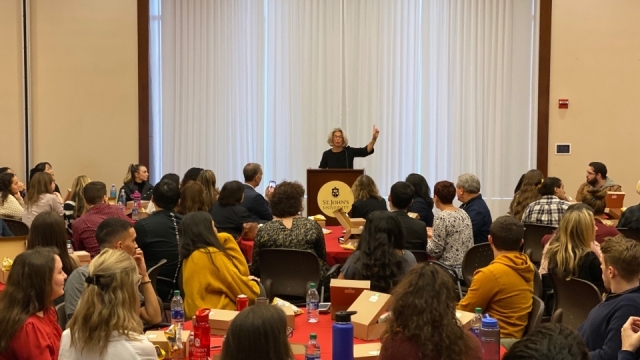
Last spring, Hon. Janet DiFiore ’81, ‘17HON announced the next phase of her Excellence Initiative, an effort to reform New York’s expansive court system under her guidance as Chief Judge of the Court of Appeals and the State of New York. Under a new Presumptive ADR approach, most state civil cases will go to mediation or another alternative dispute resolution (ADR) forum as a first step, before they can proceed in court.
Judge DiFiore’s enthusiasm for Presumptive ADR—and for her larger plan to enhance the quality of justice in New York—was palpable as she addressed St. John’s 1Ls on the first day of their January intersession Lawyering course, which teaches negotiation and other key dispute resolution skills. Praising the week-long course, and complementary offerings from the Law School’s Hugh L. Carey Center for Dispute Resolution, Judge DiFiore told the students that they are “on the ground floor” of milestone change in the legal profession.
“The new Presumptive ADR initiative memorializes a legal practice reality: most cases settle,” says Professor Elayne E. Greenberg, assistant dean for dispute resolution programs, professor of legal practice, and director of the Carey Center. “We designed Lawyering to introduce students to the skills needed to settle cases. Through the lectures, exercises, and simulations, they began to appreciate that a client’s presenting legal claims are positions and don't necessarily reflect the client's true interests. Our students learn how to help clients realize their actual interests and then negotiate more responsive options to resolve the case.”
The full-time and adjunct faculty members who teach Lawyering bring a range of expertise and practical insight to the classroom. Each year, they collaborate to refine the course curriculum to meet the needs of the students and the changing contours of the profession. In addition to Professor Greenberg, this year’s faculty included:
- Peter Jay Bernbaum
- Elaine M. Chiu
- Dennis Glazer
- Ann L. Goldweber
- Michael Kerman
- Patricia Grande Montana
- Andrew J. Simons
- Rachel H. Smith
- Ettie Ward
With their professor’s guidance, the 1Ls learn to negotiate real-world legal problems. “The goal,” Professor Greenberg says, “is to give every student a basic grounding in the theory and practice behind fundamental skills that lawyers use. The course also prepares students for the more advanced skills training available through the Law School’s clinics, internships, externships, co-curricular activities, and other professional offerings.
“My biggest takeaway coming out of the course, and especially from the simulations, is listen to your client,” says Skye Boutte ’22. “When I say listen to your client, I mean always remain aware of your client’s interests even if they change. It’s important to check in with the client, to make sure they understand and are comfortable with how things are going in the negotiation, so they feel like they are a part of getting to the ultimate goal.”
Joseph Carney ’22 also came away from Lawyering with a new take on negotiation. “There was a focus on understanding the argument of the other side, not to use it against them, but to develop an agreement that saw both sides walk away feeling that they had been heard,” he shares. “In today's society, it’s all too easy to adopt firm positions, and be deaf to those that run counter to them. The lawyering class taught me you never have to accept the views of the other side, but you do have to understand the interests that underly them in order to communicate on an emphatic level with people.”
Like her classmates, Paige Sferrazza ’22 appreciates the fresh perspective the course offers. “Among other things, I learned how important it is to have patience when conducting a negotiation,” she says. “Sometimes, the game changer is just taking a breath, putting an issue to the side, and remembering that both people at the table are just people before they are opponents.” Sferrazza also embraces Judge DiFiore’s message to her and the other 1Ls. “With the upcoming changes in our legal system, it gives me so much confidence to know that we’re in exactly the right place, getting the exact preparation we need to be ready to dive into our careers.”
Related News
St. John’s Law Students Volunteer to Close the Justice Gap for New Yorkers
On Friday afternoons, Room 116 in the Queens County Civil Courthouse becomes a bridge between classroom learning, community service, and justice in action for a dedicated group of St. John’s Law...
Law Matters: A Conversation With Professor Robin Boyle-Laisure
In this installment of our Law Matters story series, Dean Jelani Jefferson Exum speaks with Professor Robin Boyle-Laisure about her scholarship and advocacy addressing cults and human trafficking...
St. John’s University School of Law Receives Historic Gift to Name DiMartino/Smith Public Interest Center
Dean Jelani Jefferson Exum has announced that the Public Interest Center at St. John’s Law will be named the DiMartino/Smith Public Interest Center in honor of alumna Rose DiMartino ’81 and her spouse...
